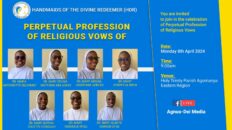LENT: PRAYER, FASTING, ALMSGIVING AND CONFESSION
FASTING
Let us now consider fasting, our spiritual servicing/maintenance, by answering the following questions: What is fasting? How not to fast? How to fast?
WHAT IS FASTING?
Fasting is a kind of abstinence. And abstinence is a voluntary self-denial of food, drinks, and other forms of legitimate pleasure (cf. 1 Cor. 7:5), with a spiritual purpose or aim in mind. Normally, then, fasting involves denying oneself of food and drinks with some spiritual intention(s) in mind. The intention may be to express true contrition for sins committed, as in the case of the people of Nineveh (Jonah 3:4-10).
One could also fast with the intention of expressing one’s humble dependence on God, as in the case of Jesus’ fast for 40 days and nights. Jesus, being sinless, certainly did not fast for any personal sins; rather He fasted to demonstrate the fact that He would rely, not on His own will, but on God the Father and the Holy Spirit in order to fulfil His mission. This is quite evident in the fact that in the temptations that followed His fast, He kept referring to God. For instance, though Jesus had the power to change stones into bread to satisfy His hunger, He preferred to humbly rely on the will of the Father. Thus He said: “Man shall not live by bread alone, but by every word that comes from the mouth of God” (Mt. 4:4).
Another reason for fasting is to dispose oneself to a close encounter with the Lord, as in the case of Moses’ fasting for forty days and nights when encountering God on Mount Sinai (Ex. 34:28). This same principle underlies the “Holy Communion fast”; unfortunately today fasting for only one hour before the reception of Holy Communion is overlooked by many of us.
HOW NOT TO FAST?
Committing sins while fasting is like pouring back the dirty engine oil into the oil tank after the car has been serviced. In other words, fasting cannot go hand-in-hand with sins. Due to the sins which some Jews committed, their fasting displeased the Lord. And when they complained that the Lord took no notice of their fast, the prophet explained:
3 ‘Why have we fasted,’ they say,
‘and you have not seen it?
Why have we humbled ourselves,
and you have not noticed?’
“Yet on the day of your fasting, you do as you please
and exploit all your workers.
4 Your fasting ends in quarreling and strife,
and in striking each other with wicked fists.
You cannot fast as you do today
and expect your voice to be heard on high.
5 Is this the kind of fast I have chosen,
only a day for a man to humble himself?
Is it only for bowing one’s head like a reed
and for lying on sackcloth and ashes?
Is that what you call a fast,
a day acceptable to the Lord? (Isa 58:3-5, NIV)
Jesus Christ also warns us against making our fast a mere external religious act performed to impress others: “When you fast, do not look somber as the hypocrites do, for they disfigure their faces to show men they are fasting. I tell you the truth, they have received their reward in full” (Matt 6:16).
HOW TO FAST?
How do we fast properly then? First, let us look at some pre-conditions to fasting: (a) we should avoid sins of anger, injustice, immorality, etc. Once again let us read from the Book of Isaiah:
6 “Is not this the kind of fasting I have chosen:
to loose the chains of injustice
and untie the cords of the yoke,
to set the oppressed free
and break every yoke?
7 Is it not to share your food with the hungry
and to provide the poor wanderer with shelter —
when you see the naked, to clothe him,
and not to turn away from your own flesh and blood?
8 Then your light will break forth like the dawn,
and your healing will quickly appear;
then your righteousness will go before you,
and the glory of the Lord will be your rear guard.
9 Then you will call, and the Lord will answer;
you will cry for help, and he will say: Here am I (Isa 58:6-9).
(b) Our focus should be on God. For this reason, Jesus says that “when you fast, put oil on your head and wash your face, so that it will not be obvious to men that you are fasting, but only to your Father, who is unseen; and your Father, who sees what is done in secret, will reward you” (Mt. 6:17-18).
(c) Fasting is not a mere famishing; it should therefore be accompanied by prayer, almsgiving and other good deeds.
Now as to the content or format of fasting, there are various kinds: a meal per day; an early light breakfast (6am) and supper (6pm) especially when one intends to fast for several days; taking only bread and water; etc.
By Most Rev. John Kobina Louis








